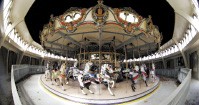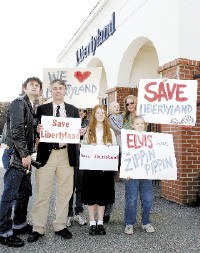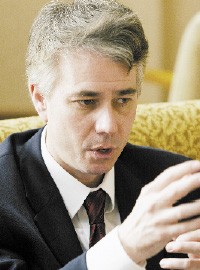Libertyland, the amusement park that has operated in Memphis for 30 years, is officially closed. In November, the Mid-South Fair’s board of directors (which controls the park) voted to cease Libertyland’s operations, citing several years of financial losses. Libertyland’s equipment was to be sold, including two rides on the national register of historic places — the carousel and Elvis’ favorite roller coaster, the Zippin’ Pippin. A headline in the Memphis Daily News warned, “The Chopping Block Looms.”
But before the ax hit the chopping block along came a group of activists calling themselves Save Libertyland — a classic Memphis mix of quixotic idealism, persistence, and legal ingenuity. Due to their efforts, and to recent legal action by the city, Libertyland may have life in it yet.

The Wipeout
Libertyland sits on the Mid-South Fairgrounds, a piece of public property that the city is eager to revitalize and re-imagine. “It is really the nexus between East Memphis and what is going on downtown,” says Robert Lipscomb, Memphis director of housing and community development. “I think it’s underutilized and potentially has much greater value. Our job is maximizing that asset.”
Lipscomb organized the Mid-South Fairgrounds Re-Use Committee, which was assigned to study the area. On November 4, 2005, the committee viewed six scenarios drawn up by the architectural firm Looney Ricks Kiss. The scenarios were designed to provide integrated residential, commercial, and public space, with an eye to revitalizing the land while preserving some of its history.
The committee chose scenario number five, with its large green space, small-scale retail, and 40-plus acres for sports and recreation, as the “highest and best” use of the land. That scenario did not include Libertyland, the Mid-South Coliseum, or the Mid-South Fair. While the committee’s decision was not binding, it was intended to guide the City Council in making its final decision on the property. That same day, in a decision board members later said was unrelated, but which, due to issues of leasing, was inextricably linked, the Mid-South Fair board voted to close Libertyland and liquidate the rides and equipment.
“We did not have good luck with Libertyland, though we operated it for a good while,” says board president Eugene Smith.
Rick Winchester, a board member and former board president, elaborates: “We had been losing money for several years, but we still believed in what we were doing and in the value of Libertyland to the community. Sadly, it was no longer attracting the numbers of people we needed to make it work.”
Winchester says that it was something of a Catch-22 for the board: Revitalizing the park required investing in new rides. To invest in new rides, Libertyland needed a substantial loan, and to secure financing for such a loan, a park operator would need a long-term lease, something the city had been unwilling to grant.
Winchester told The Commercial Appeal that the “lack of support from the city had a lot to do with our recommendation to close.”

The Rebellion
Save Libertyland met for the first time on November 11th. In attendance among the half-dozen or so interested parties were Midtowner Denise Parkinson, local filmmaker Michael McCarthy, and University of Memphis law professor Steve Mulroy. They became the core trio that would energize and devise the group’s plan of action.
“We were thinking about different things,” says Mulroy. “We wondered if Libertyland could be viable with a long-term lease. We thought if the city won’t listen to reason, can we at least save the historic rides?”
The group began by organizing protests and benefits and collecting signatures for a petition to save the park. They joined forces with the rock group the Zippin’ Pippins, which staged benefit concerts in support of their namesake.
McCarthy was ubiquitous, from protests outside Libertyland to town-hall meetings and late-night rock shows, keeping his camera rolling and needling questions and comments at anyone who would listen. “This city is out to destroy its own history,” he says. “Maybe they should build a new ride at the park called the Land Developer, where the tracks disappear behind you.”
Save Libertyland also had help from Nick Davis, who runs the local interest Web site DetourMemphis.com. Davis kept a blog, with updates on the group’s progress and events. He also hosted the group’s online petition.
Soon, a few local politicians, including City Council members Carol Chumney and Dedrick Brittenum, expressed support for the group.
But despite Save Libertyland’s best efforts, the group was unable to get responses from the city or from the Mid-South Fair board. “With the Mid-South Fair, it was ups and downs and conflicting stories,” says Mulroy. “We eventually came to feel we didn’t want to rely on anyone. They told me the groundwork for the auction was being laid, and the situation began to look grim.”

The Revolution
Two events turned the tide for the Save Libertyland campaign. The first was when the group made contact with officials from two companies that specialize in turning around failing theme parks. The second was when they managed to stop the auction of Libertyland’s equipment.
Robert Barnard is chief operating officer of T-Rex Entertainment, which has reinvigorated two failing parks, one in Washington state and another in Detroit. (The other theme-park developer contacted by Save Libertyland is choosing to remain anonymous at this stage of negotiations.) Barnard says he contacted the city and the Mid-South Fair board to discuss a possible offer on the park. The first person he talked to was Pete Aviotti, special assistant to Mayor Herenton, and a member of the Fairgrounds Re-Use Committee. Barnard says Aviotti told him that the fair had a lease on Libertyland. This was later discovered to be incorrect.
Barnard says he then spoke to Ron Hardin, the fair’s former general manager, and to the fair board’s president, Smith. Both discouraged him, saying that the board had settled the issue in November. “I called Mid-South Fair and offered to lease the property for $10,000 a month with the option to purchase, while we looked for a new site if necessary,” recalls Barnard. “Dr. Smith said that was not an option, that they were getting out of the business and liquidating their assets.”
But Hardin was quoted in The Commercial Appeal in November as saying, “If someone wanted to hop in there with a bunch of money … and try and get Libertyland open, we would absolutely talk to them about leasing or purchasing the equipment.”
Smith may not have informed other board members about Barnard’s offer. When the Flyer asked fair-board vice president Belinda Anderson about potential investors, she said, “I haven’t heard about these offers. But I’m sure if someone came with a check and was ready to go, the board would at least be interested.”
The issue of who holds the lease was officially cleared up later that week. The fair’s 10-year lease had expired in 1996. According to Aviotti, Libertyland has been allowed to operate since then without a lease. Aviotti now says that the city will at least consider offers for a long-term lease. Both Barnard and the anonymous developer are preparing letters of intent for the city.
The second, and perhaps greater, accomplishment of Save Libertyland was stopping the equipment auction. In a piece of clever legal maneuvering, Mulroy asked whether the city might have a legal stake in the rides and equipment that were being put up for auction.
Soon after, the city announced that its legal department is looking into which rides are owned in part or in toto by the city. A city ordinance says it is illegal to sell park property without the express permission of the City Council.
“We’ve managed, at least for now, to gum up the works of those who are out to destroy Memphis history brick by brick,” says McCarthy.
The Future
The future of Libertyland is still far from certain, but the Save Libertyland campaign has stopped what seemed to be preordained dominos from falling. By attracting investors, the group was able to provide two of the prerequisites Rick Winchester said would be necessary for saving the park: an influx of funds and the possibility of a long-term lease from the city.
And by stalling the proposed auction, the assets of Libertyland will remain in place while the lengthy process of determining the fairgrounds’ future unwinds in the City Council. It is clear that the 140 acres of land under consideration will be hotly contested. Several significant proposals have already come along, most notably the KROC Center, funded by a $48 million grant.
But Save Libertyland has at least given the park another chance. And by attracting investors, the park embodies one of the Looney Ricks Kiss guiding principles (#20): that site features be self-financing.
Libertyland actually meets many of the LRK proposed Master Principles. It is a public amenity (#1) which broadens the scope of the fairgrounds (# 3). It helps to cultivate civic pride (#5) and maintains the historic character of the grounds (#7).
At a City Council meeting last week, Cato Johnson, chairman of the Fairgrounds Re-use Committee, spoke about Libertyland: “If there was a viable proposal, we would entertain that. Right now, we have nothing to evaluate, but it’s not outside the realm of possibility.”
Other developers are interested in the property, whether for mixed-used office space or student housing, but Johnson says they have received nothing definite. “No one has come and said we want to put this type of housing here,” he says.
Lipscomb and Robert Fouche, city parks services director, are expected to report on funding sources for potential developments on the fairgrounds in April.
“If people want to see Libertyland stay, now is the time to act,” says Mulroy. “Call the mayor. Call your councilperson. Let them know you think Libertyland is a vital piece of Memphis.”
Off To See the Wizard
Who are these people and how did they do it? by Mary Cashiola
Denise Parkinson, Michael McCarthy, and Steve Mulroy are as disparate as Dorothy, the Tin Man, and the Scarecrow in The Wizard of Oz.
A housewife, a filmmaker, and a law professor are the driving force behind Save Libertyland, founded after the Mid-South Fair voted to close the park in November.
“She’s the ringleader,” McCarthy says of Parkinson. “She started it all.”
Parkinson, an energetic activist, says she takes her kids to Libertyland every summer. “It’s so much fun,” she says. “It’s small enough that you don’t drop from exhaustion. … We have the best of both worlds here. We have a wonderful theme park that’s actually manageable for a family, economically and in every way.”

But Parkinson is also concerned about the overall effect of the closure on the community.
“I saw this happen in Little Rock, where they closed this little kiddie park. Then they started closing down all the summer jobs programs and the community centers, and so we had this gang-activity spike,” she says. “[When they closed Libertyland] I was like, here we go.”
McCarthy had been working on a documentary about the Zippin’ Pippins, an all-girl band named after Elvis’ favorite roller coaster. Then Libertyland closed and McCarthy found he had a new project.
“I was copied on an e-mail from [Parkinson’s sister] that said I was making a documentary on Libertyland. I always do what she asks, so the next thing I knew I was making a documentary about Libertyland,” he says.
The trio gelled at a meeting at McCarthy’s house.
“I saw an article in The Commercial Appeal about the attempt to save Libertyland,” says Mulroy. “My kids are big fans of it and I thought it was a worthwhile cause. My wife said, why don’t you offer to help? … I think after [Parkinson and McCarthy] found out what I did for a living, they started pushing me toward a more prominent role than I had originally anticipated.”
Since its inception, Save Libertyland has focused on the number of jobs — many held by teenagers and first-time employees — that will be lost. But at issue, they agree, is much more than that.
“It’s a quality-of-life issue,” says Mulroy, “because it’s a place for familes to go to do something unique. It’s part of Memphis’ history and culture. It’s affordable: Working-class families can go. And if we replace it with generic town-homes, Memphis becomes a little more generic and a little less family-friendly.”

“Totally,” says Parkinson, and laughs. “What he said. He’s our brain.”
Rick Winchester, former president of the Mid-South Fair board and current executive committee member, has said it would take three things to save Libertyland: an influx of capital, a long-term lease, and political support from the city and the county. Assuming that’s true, Save Libertyland has found some success and, perhaps unexpectedly, even seems to have a chance of saving the park.
Early on, Parkinson and her sister began e-mailing amusement-industry insiders and “anyone we could think of,” says Parkinson.
Because of their attempts, the group has met with T-Rex Entertainment, a theme-park company out of Kansas that is interested in the property, as well as another operator — still unnamed publicly — with 30 years in the business.
“I think the prospects are reasonable because there have been a couple of significant developments,” says Mulroy. “First, the two outside amusement-park companies have expressed interest, and both these companies have track records of saving ‘failing parks,’ what they call turn-arounds.”
Even before Libertyland closed, however, the issue of a long-term lease was a problem for its operators.
“There’s been a little movement on the city administration’s part because they’ve gone from an initial position of where they would only grant a one-year lease to where they’re willing to talk about a long-term lease,” says Mulroy.
Save Libertyland estimates a new company would need about eight years to recoup its investment in the park.
“We need a long-term commitment from the city to support this,” says Mulroy.
If Save Libertyland lacks anything, it may be political clout. Parkinson and McCarthy both have a radical streak, and Mulroy, though a candidate for a County Commission seat, is no political insider.
In fact, if Parkinson is Dorothy, Mayor Willie Herenton is the ever-elusive wizard.
“Robert Bernard of T-Rex Entertainment got in touch with us because he had — on his own — tried to contact the mayor,” says Parkinson. “The mayor never responded. The mayor still won’t address this issue.”
And because the mayor’s signature is the one on the lease, he’s the one Parkinson wants to talk to. “He is the leasing authority, so if he doesn’t want Libertyland fixed up, he can kill it,” she says.
And though Save Libertyland has gathered hundreds of signatures on paper and via Internet petitions, Libertyland’s actual land is very important to the city.
Last week, architects presented possible scenarios for the re-use of the 170 acres around the fairgrounds to a City Council committee. The property includes the Liberty Bowl, the Mid-South Coliseum, Fairview Junior High, and the area where Tim McCarver Stadium once stood. The only entity on the property that puts money into the city’s coffers is the monthly flea market. During the meeting, members of the Fairgrounds Re-Use Committee were careful to point out that Libertyland was still — at least, in theory — a viable option. But the land is important to the city’s master plan.
“This is the nexus of East Memphis and the western part of the city,” says Robert Lipscomb, city chief financial officer. “The Highland Strip is being redone in the U of M area. That area flows into the arts district, which flows into the medical center and downtown. This is a key part of the redevelopment of the core city and downtown.” Save Libertyland counters that the park is consistent with whatever happens to the fairgrounds.
“Libertyland is compatible with a recreation area. It’s compatible with mixed-use development,” says Mulroy. “There’s plenty of room for all of that, and you can still retain Libertyland.”
“We don’t want a scenario where the Mid-South Fair sees Libertyland as a cash cow,” says Mulroy. “The auction probably would have occurred already if we hadn’t slowed them down.”
The city attorney’s office is currently exploring who owns the rides and assets of Libertyland and is expected to present a legal opinion to the City Council within the next few weeks. Because the Zippin’ Pippin and the carousel existed on-site before Libertyland was created in 1976, it seems certain that the Mid-South Fair cannot claim ownership.
“So many people have almost an embarrassment about Libertyland. It’s just, ugh, it’s not good enough, or let’s get rid of it,” says Parkinson. “It was run by a nonprofit, so they didn’t have the mindset of let’s make this the best park in the world. We’ve found people who do have that mindset.”
“If you look at where we started and where we are now, it’s an incredible improvement,” says Mulroy.







